维克多词汇新方略 unit 11 语言学习 unit 11
- 格式:ppt
- 大小:37.50 KB
- 文档页数:3
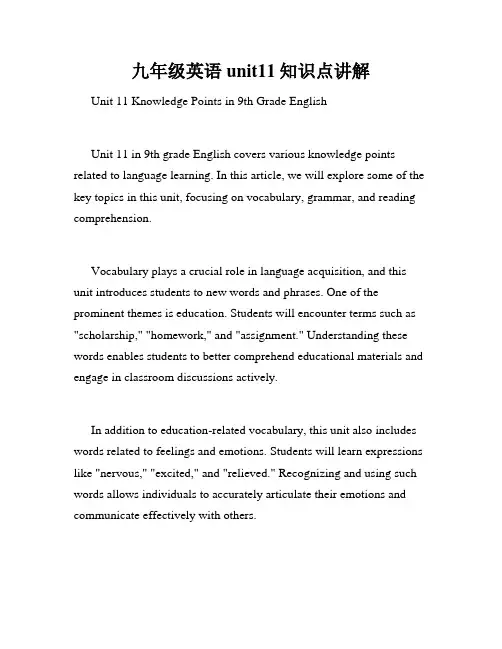
九年级英语unit11知识点讲解Unit 11 Knowledge Points in 9th Grade EnglishUnit 11 in 9th grade English covers various knowledge points related to language learning. In this article, we will explore some of the key topics in this unit, focusing on vocabulary, grammar, and reading comprehension.Vocabulary plays a crucial role in language acquisition, and this unit introduces students to new words and phrases. One of the prominent themes is education. Students will encounter terms such as "scholarship," "homework," and "assignment." Understanding these words enables students to better comprehend educational materials and engage in classroom discussions actively.In addition to education-related vocabulary, this unit also includes words related to feelings and emotions. Students will learn expressions like "nervous," "excited," and "relieved." Recognizing and using such words allows individuals to accurately articulate their emotions and communicate effectively with others.Grammar is another significant aspect of language acquisition covered in Unit 11. Verb tenses, specifically the past continuous and the past perfect, are the primary focus. These tenses are essential for describing and narrating past events in a precise manner.The past continuous tense is used to describe an ongoing action or event in the past. For example, "I was studying when she called me." This tense emphasizes the duration of the action in relation to other events.The past perfect tense, on the other hand, is used to indicate that an action occurred before another action in the past. For instance, "He had finished his homework before he went to the party." The past perfect tense helps in establishing the chronological order of events.While mastering grammar is crucial, reading comprehension is equally important for overall language proficiency. Unit 11 introduces various reading passages to enhance students' reading skills. These texts cover a wide range of topics, from biographies to newspaper articles.One particular passage delves into the life of Malala Yousafzai, the Nobel Peace Prize laureate from Pakistan. Through this reading,students can learn about her dedication to girls' education and her courageous fight against the suppression of education for women. This inspiring story not only broadens students' knowledge but also encourages them to pursue their dreams ardently.Another passage explores the impact of technology on education. Students will explore the advantages and disadvantages of using technology in the classroom. This topic allows students to critically analyze the influence of technology on learning and to develop their own opinions.To further enhance reading comprehension, the unit also introduces various comprehension exercises. These exercises test students' understanding of the texts and their ability to extract key information. By completing these exercises, students can sharpen their analytical skills and improve their overall reading proficiency.In conclusion, Unit 11 in 9th grade English covers a wide range of knowledge points to enhance students' language learning experience. From vocabulary expansion to mastering verb tenses and improving reading comprehension, this unit offers a comprehensive approach to language acquisition. By continuously practicing and applying theseknowledge points, students can strengthen their English skills and become more confident in expressing themselves.。
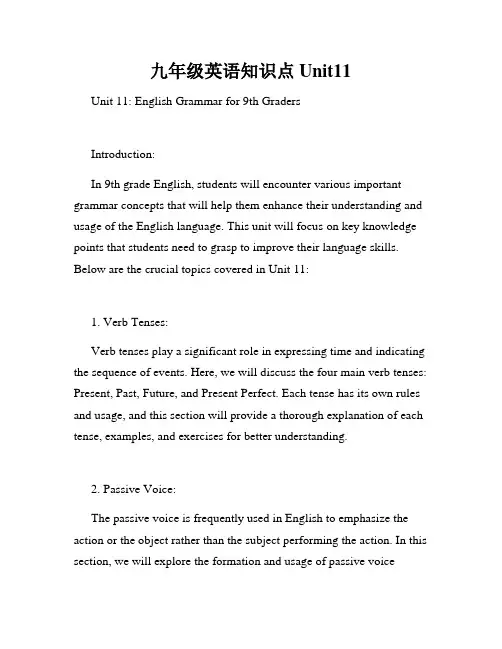
九年级英语知识点Unit11Unit 11: English Grammar for 9th GradersIntroduction:In 9th grade English, students will encounter various important grammar concepts that will help them enhance their understanding and usage of the English language. This unit will focus on key knowledge points that students need to grasp to improve their language skills. Below are the crucial topics covered in Unit 11:1. Verb Tenses:Verb tenses play a significant role in expressing time and indicating the sequence of events. Here, we will discuss the four main verb tenses: Present, Past, Future, and Present Perfect. Each tense has its own rules and usage, and this section will provide a thorough explanation of each tense, examples, and exercises for better understanding.2. Passive Voice:The passive voice is frequently used in English to emphasize the action or the object rather than the subject performing the action. In this section, we will explore the formation and usage of passive voicesentences, including the conversion of active voice sentences to passive voice and vice versa.3. Conditionals:Conditionals are sentences that express consequences or hypothetical situations. There are four types of conditionals: zero, first, second, and third conditional. We will delve into each conditional type, explaining the structure, usage, and providing examples to clarify how they are employed in conversations and writing.4. Reported Speech:Reported speech is used to convey someone else's words in indirect form. In this section, we will focus on transforming direct speech into reported speech, including changes in verb tenses, pronouns, and time expressions. Extensive examples and exercises will help students practice and master this important skill.5. Modals:Modals are auxiliary verbs used to express various meanings such as ability, possibility, necessity, and permission. This section will discuss the different modals, their usage, and how they can be appliedin different contexts. Students will also have the opportunity to practice using modals in sentences to solidify their understanding.6. Question Forms and Tags:Asking questions and using question tags are essential skills for effective communication. This section will cover different question forms (Wh-questions, Yes/No questions, and alternative questions) as well as question tags. Students will learn how to correctly construct questions and tags, using appropriate word order and intonation.Conclusion:Unit 11 of the 9th-grade English curriculum covers crucial grammar knowledge points to strengthen students' understanding and application of the English language. Mastery of these concepts will enhance their overall proficiency and enable them to communicate effectively in both spoken and written English. It is important for students to practice these grammar skills regularly and seek further guidance when needed to solidify their knowledge.。
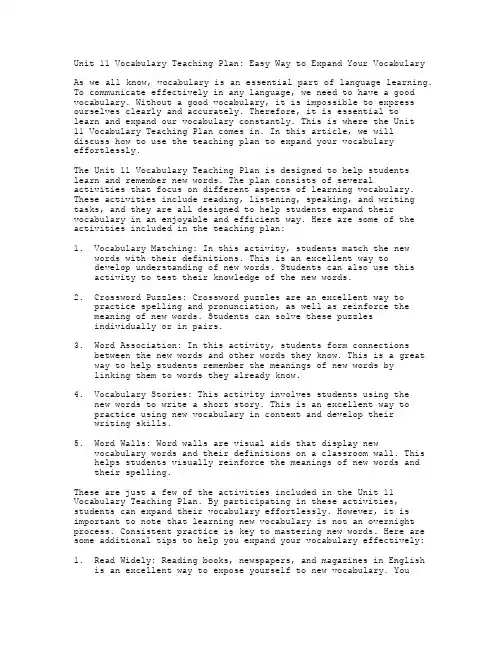
Unit 11 Vocabulary Teaching Plan: Easy Way to Expand Your Vocabulary As we all know, vocabulary is an essential part of language learning. To communicate effectively in any language, we need to have a good vocabulary. Without a good vocabulary, it is impossible to express ourselves clearly and accurately. Therefore, it is essential tolearn and expand our vocabulary constantly. This is where the Unit11 Vocabulary Teaching Plan comes in. In this article, we willdiscuss how to use the teaching plan to expand your vocabulary effortlessly.The Unit 11 Vocabulary Teaching Plan is designed to help studentslearn and remember new words. The plan consists of severalactivities that focus on different aspects of learning vocabulary. These activities include reading, listening, speaking, and writing tasks, and they are all designed to help students expand their vocabulary in an enjoyable and efficient way. Here are some of the activities included in the teaching plan:1.Vocabulary Matching: In this activity, students match the newwords with their definitions. This is an excellent way todevelop understanding of new words. Students can also use thisactivity to test their knowledge of the new words.2.Crossword Puzzles: Crossword puzzles are an excellent way topractice spelling and pronunciation, as well as reinforce themeaning of new words. Students can solve these puzzlesindividually or in pairs.3.Word Association: In this activity, students form connectionsbetween the new words and other words they know. This is a great way to help students remember the meanings of new words bylinking them to words they already know.4.Vocabulary Stories: This activity involves students using thenew words to write a short story. This is an excellent way topractice using new vocabulary in context and develop theirwriting skills.5.Word Walls: Word walls are visual aids that display newvocabulary words and their definitions on a classroom wall. This helps students visually reinforce the meanings of new words and their spelling.These are just a few of the activities included in the Unit 11 Vocabulary Teaching Plan. By participating in these activities, students can expand their vocabulary effortlessly. However, it is important to note that learning new vocabulary is not an overnight process. Consistent practice is key to mastering new words. Here are some additional tips to help you expand your vocabulary effectively: 1.Read Widely: Reading books, newspapers, and magazines in Englishis an excellent way to expose yourself to new vocabulary. Youcan also use online resources such as blogs, articles, andwebsites to read in English.2.Watch English Movies and TV Shows: Watching movies and TV showsin English can help you not only improve your listening skills but also expand your vocabulary. You can use subtitles to help you understand new words and phrases.e Online Resources: There are many free online resources thatcan help you expand your vocabulary. These include flashcards, word games, and vocabulary quizzes.4.Keep a Vocabulary Notebook: Keeping a notebook where you writedown new words, their meanings, and how to use them in context is an effective way to remember new vocabulary.In conclusion, expanding your vocabulary is essential for improving your English language skills. The Unit 11 Vocabulary Teaching Plan provides an enjoyable and effective way to learn new words. However, consistent practice is key to mastering new vocabulary. By following the tips mentioned in this article and using the Unit 11 Vocabulary Teaching Plan, you can expand your vocabulary effortlessly.。
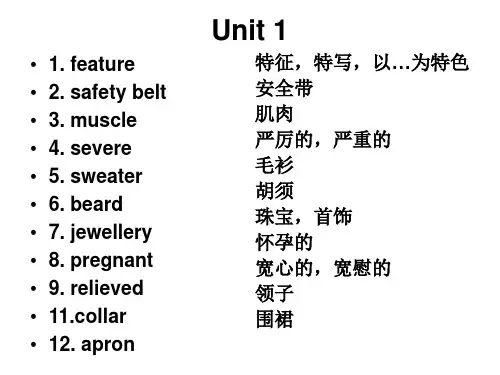
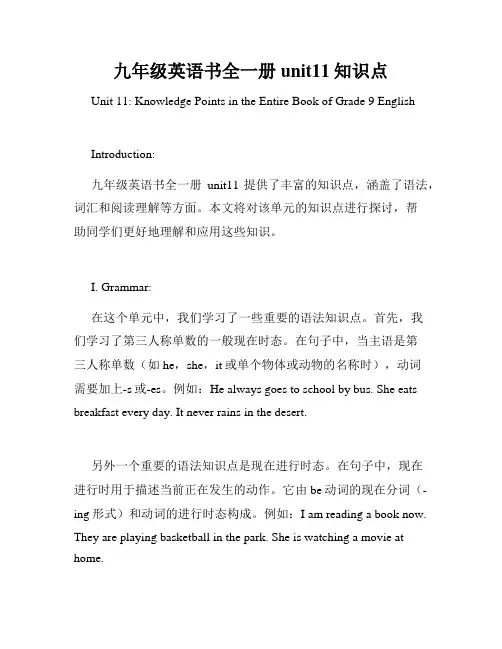
九年级英语书全一册unit11知识点Unit 11: Knowledge Points in the Entire Book of Grade 9 EnglishIntroduction:九年级英语书全一册unit11提供了丰富的知识点,涵盖了语法,词汇和阅读理解等方面。
本文将对该单元的知识点进行探讨,帮助同学们更好地理解和应用这些知识。
I. Grammar:在这个单元中,我们学习了一些重要的语法知识点。
首先,我们学习了第三人称单数的一般现在时态。
在句子中,当主语是第三人称单数(如 he,she,it或单个物体或动物的名称时),动词需要加上-s或-es。
例如:He always goes to school by bus. She eats breakfast every day. It never rains in the desert.另外一个重要的语法知识点是现在进行时态。
在句子中,现在进行时用于描述当前正在发生的动作。
它由be动词的现在分词(-ing形式)和动词的进行时态构成。
例如:I am reading a book now. They are playing basketball in the park. She is watching a movie at home.II. Vocabulary:该单元中还涉及了一些重要的词汇知识点。
我们学习了一些形容词和副词的比较级和最高级形式。
当我们比较两个事物时,通常使用比较级,而当我们比较三个或三个以上事物时,我们使用最高级。
形容词的比较级通常在词尾加-er,最高级在词尾加-est。
例如:fast - faster - fastest,expensive - more expensive - most expensive。
此外,在该单元中,我们还学习了一些关于购物和商店的词汇。
例如:cashier(收银员),receipt(收据),discount(折扣)等。
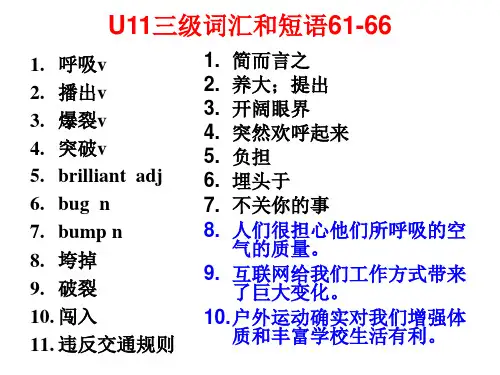
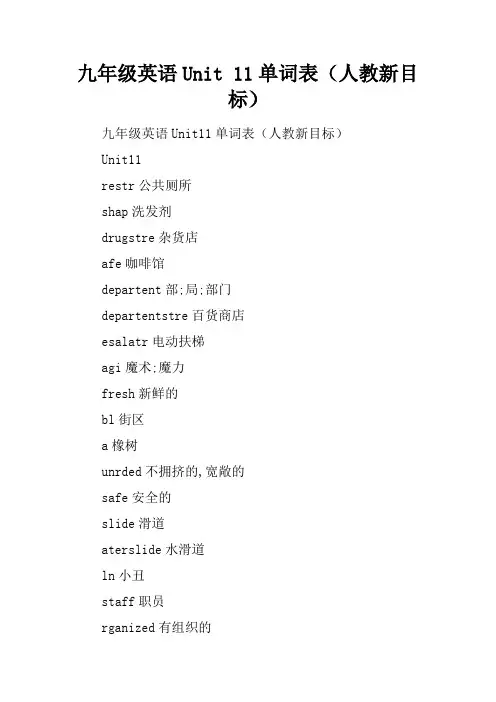
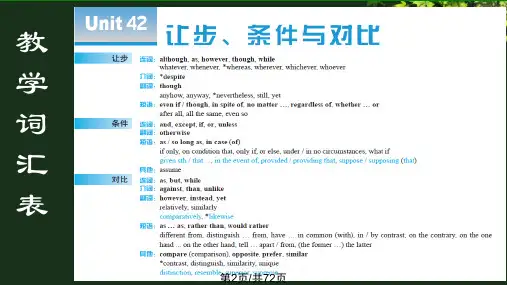
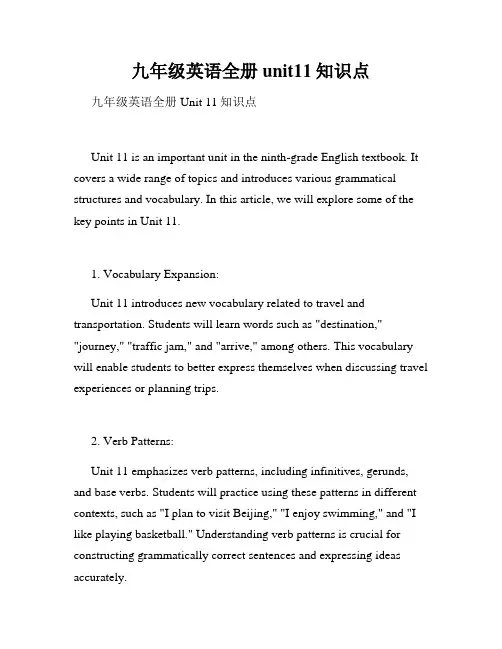
九年级英语全册unit11知识点九年级英语全册Unit 11知识点Unit 11 is an important unit in the ninth-grade English textbook. It covers a wide range of topics and introduces various grammatical structures and vocabulary. In this article, we will explore some of the key points in Unit 11.1. Vocabulary Expansion:Unit 11 introduces new vocabulary related to travel and transportation. Students will learn words such as "destination," "journey," "traffic jam," and "arrive," among others. This vocabulary will enable students to better express themselves when discussing travel experiences or planning trips.2. Verb Patterns:Unit 11 emphasizes verb patterns, including infinitives, gerunds, and base verbs. Students will practice using these patterns in different contexts, such as "I plan to visit Beijing," "I enjoy swimming," and "I like playing basketball." Understanding verb patterns is crucial for constructing grammatically correct sentences and expressing ideas accurately.3. Modal Verbs:Modal verbs play a significant role in Unit 11. Students will learn how to use modal verbs such as "can," "could," "may," and "might" to express abilities, possibilities, and permission. For example, students will practice using sentences like "I can swim," "I could finish the project," and "May I go to the restroom?" Mastering modal verbs is essential for effective communication in English.4. Conditional Sentences:Unit 11 introduces different types of conditional sentences, including zero, first, and second conditional. Students will learn how to form these sentences and use them to express hypothetical situations and their possible outcomes. For example, students will practice constructing sentences like "If it rains, we will stay indoors" or "If I had time, I would visit my grandparents."5. Reading Comprehension:Unit 11 includes various reading passages that allow students to enhance their reading comprehension skills. The passages cover topics related to travel and exploration, providing opportunities for students to improve their understanding of the English language while learning new vocabulary and grammatical structures.6. Writing Practice:Students in Unit 11 will engage in writing exercises that focus on descriptive writing, narrative writing, and expressing opinions. These activities will help students develop their writing skills and enable them to convey their thoughts and ideas effectively in written form.7. Listening Practice:Unit 11 offers a range of listening activities that allow students to improve their listening comprehension skills. Students will listen to dialogues, conversations, and monologues related to travel experiences, transportation, and cultural exploration. These activities enhance students' ability to understand spoken English and familiarize them with different accents and speech patterns.In conclusion, Unit 11 of the ninth-grade English textbook covers a diverse range of topics and essential language skills. From vocabulary expansion and verb patterns to modal verbs, conditional sentences, reading comprehension, writing practice, and listening exercises, this unit provides students with extensive opportunities to enhance their English language proficiency. By actively engaging in the lessons and completing the exercises, students will develop a solid foundation inEnglish that will serve them well in their future language learning endeavors.。
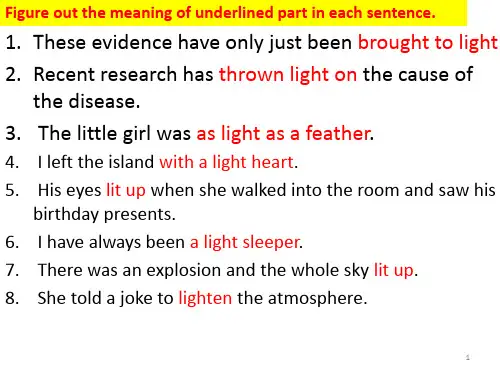
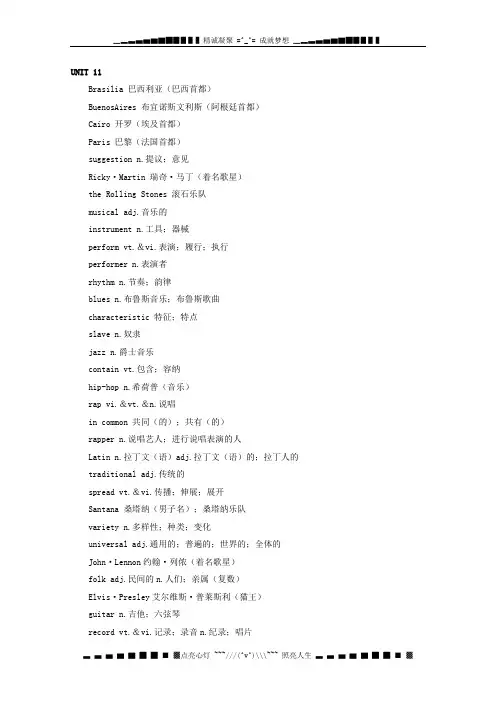
UNIT 11Brasilia 巴西利亚(巴西首都)BuenosAires 布宜诺斯文利斯(阿根廷首都)Cairo 开罗(埃及首都)Paris 巴黎(法国首都)suggestion n.提议;意见Ricky·Martin 瑞奇·马丁(着名歌星)the Rolling Stones 滚石乐队musical adj.音乐的instrument n.工具;器械perform vt.&vi.表演;履行;执行performer n.表演者rhythm n.节奏;韵律blues n.布鲁斯音乐;布鲁斯歌曲characteristic 特征;特点slave n.奴隶jazz n.爵士音乐contain vt.包含;容纳hip-hop n.希荷普(音乐)rap vi.&vt.&n.说唱in common 共同(的);共有(的)rapper n.说唱艺人;进行说唱表演的人Latin n.拉丁文(语)adj.拉丁文(语)的;拉丁人的traditional adj.传统的spread vt.&vi.传播;伸展;展开Santana 桑塔纳(男子名);桑塔纳乐队variety n.多样性;种类;变化universal adj.通用的;普遍的;世界的;全体的John·Lennon约翰·列侬(着名歌星)folk adj.民间的n.人们;亲属(复数)Elvis·Presley艾尔维斯·普莱斯利(猫王)guitar n.吉他;六弦琴record vt.&vi.记录;录音n.纪录;唱片turn....in to 把……变成versus prep.(=vs)对(指诉讼、比赛等中);与……相对satisfy vt.满足;使满意inner adj.内心的;内部的;里面的desire n.愿望;心愿;要求vt.期望;希望;请求emotion n.情感;感情;情绪process n.过程;程序;方法vt.制作;加工;处理musician n.音乐家totally adv.完全地;整个地express vt.表达;表示entertain vt.&vi.使欢乐;招待;款待intelligence n.智力;聪明;智能chant n.(有节奏地、反复地)唱或喊叫的词语。
高中英语词汇大全:UNIT11criterion n.(复数criteria)标准;尺度stick with 继续支持;保持联系through thick and thin 不顾艰难pull out of 从……中退出summary n.总结;概要percentage n.百分比;百分率frequency n.频率;频繁questionnaire n.问卷;调查表reputation n.名声;名誉;名气colleague n.同事;同僚suspect vt. 怀疑;不相信suspect n. 嫌疑犯;可疑对象management n.管理;管理部门;主管人员staff n.全体职工;全体雇员requirement n.需要;要求;必要的条件sake n.目的;缘故for the sake of 由于;为了……的利益in reality 事实上;实际上individual adj.单独的;个别的n.个人temporary adj.暂时的;临时的coach n.教练;长途公共汽车cooperate vi.合作;协作uncertain adj.不确切的;无把握的expectation n.预料;期待;期望division n.分割;划分;除(法)rugby n.(英式)橄榄球keep an eye on 照料;照管compromise n.妥协;和解;折衷excite vt.使兴奋;使激动regulation n.规章;条例bureaucratic adj.官僚的;官僚制度的take ... into account 考虑;体谅dynamic adj.动力的;强有力的;动态的shortcoming n.缺点;缺陷embarrass vt.使尴尬;使为难contradictory adj.互相矛盾的;互相对立的violent adj.暴力的;强烈的explosion n.爆炸(声)resign vi.辞职ambitious adj.有雄心的;雄心勃勃的as a whole 普遍说来;作为整体actual adj.真实的;实在的;实际的definite adj.确切的;肯定的stall n.摊位;铺子;售货亭hairdresser n.美发师;理发师congratulate vt.祝贺;庆贺smooth adj.顺利的;光滑的;平坦的finance n.财政(学);金融;(复数)资金vt.为……提供资金;提供款项once again 再一次combination n.结合;混合物bride n.新娘exceptional adj.异常的;特殊的live up to 依照…行事;做到;不辜负(期望)shame n.羞耻;惭愧;遗憾的事pursue vt.追求;追逐intellectual adj.智力的;用脑力的n.知识分子;脑力劳动者hands-on adj.亲身实践的;实习的accommodate vt.适应;供给膳宿complement vt.补充;与……互补qualitative adj.性质的;质量的decline vi.拒绝;变小;变少;变弱vt.拒绝;使下降n.下降;衰退;斜坡oral adj. 口头的;口述的;口(用)的。
九年级英语unit11知识点课件Unit 11 in 9th grade English curriculum covers various knowledge points that are crucial for language learning and development. In this article, we will explore the key themes covered within this unit and discuss their significance in enhancing language skills.1. Vocabulary Expansion:Unit 11 focuses on expanding students' vocabulary base by introducing new words and phrases. This plays a vital role in improving language fluency and comprehension. Learning new vocabulary helps students express themselves more precisely and effectively. Mastering words related to hobbies, pastimes, and interests can also enrich conversations and facilitate better communication.2. Contextual Understanding:One of the goals of Unit 11 is to enhance students' ability to grasp contextual meaning. By learning how to infer meanings from context, students can decipher the intended message even when encountering unfamiliar words or phrases. This skill is crucial for effective reading, as it allows students to comprehend texts beyond mere word-to-word translations.3. Grammar Structures:Unit 11 introduces several essential grammar structures. Students study the present perfect tense, which is commonly used to express experiences and actions that have occurred in the past but have a connection to the present. Understanding and utilizing this tense empowers students to articulate their thoughts more accurately and convey a timeline of events correctly.4. Sentence Variation:Unit 11 also emphasizes the importance of sentence variation. Students are encouraged to diversify their sentence structures by using different sentence types, such as simple, compound, and complex sentences. This skill ensures more engaging and coherent writing, promoting effective communication and demonstrating linguistic creativity.5. Speaking and Listening Skills:Unit 11 provides various opportunities for students to develop their speaking and listening skills. Engaging in conversations about hobbies, interests, and aspirations allows students to practice active listening and oral expression. Collaborative activities, such as role-plays and group discussions, foster a supportive learning environment that encourages students to articulate their thoughts confidently.6. Cultural Insights:Aside from language development, Unit 11 also introduces students to different cultures and encourages cultural appreciation. By exploring hobbies and interests from various countries, students gain insight into global diversity and foster respect for different lifestyles. This promotes intercultural understanding, which is crucial in an increasingly interconnected world.7. Critical Thinking:Unit 11 incorporates critical thinking exercises to stimulate students' analytical and problem-solving skills. By engaging in activities that require them to evaluate and extract relevant information from texts, students enhance their cognitive abilities. This fosters independent thinking and encourages students to approach challenging tasks with confidence.8. Reflective Writing:Unit 11 incorporates reflective writing tasks that encourage students to introspect and express their thoughts and feelings. Reflective writing enables self-awareness and enhances emotional intelligence, allowing students to explore their interests, strengths, and areas for improvement. This promotes personal growth and self-expression.In conclusion, Unit 11 of the 9th grade English curriculum encompasses various knowledge points that are essential for language development. By focusing on vocabulary expansion, contextual understanding, grammar structures, sentence variation, speaking and listening skills, cultural insights, critical thinking, and reflective writing, students can enhance their language fluency and overall communication abilities. These skills not only empower students in English but also equip them with valuable tools for success in their personal and professional lives.。
维克多新方略英语词汇答案[P.1]v. 遗弃;离开;放弃;终止;陷入n. 放任,狂热[abandon] adj. 被抛弃的;(房屋,车辆)被废弃的;无约束的,恣意放荡的v. 抛弃;离弃;放弃(abandon 的过去式和过去分词)[abandoned] n. 能力,能耐;才能[ability] adj. 能;[经管] 有能力的;能干的[able] adv. 巧妙地;精明能干地[ably] adj. 反常的,不规则的;变态的[abnormal] adv. 在(飞机、火车、船)上;骑在(马)上;(喻)新入伙;(棒球)在垒上prep. 在(船或飞机)上[aboard] vt. 废除,废止;取消,革除[abolish][P.2]n. 流产,堕胎,小产;流产的胎儿;(计划等)失败,夭折[abortion] adv. 大约;将近;到处;(特定位置)四下;闲着;周围;掉头prep. 关于;目的是;针对;忙于;因为;在……到处;在……四处;在……附近;在……(具有某种品质);围绕;为……感到adj. 在场的,可得到的;就要……的;四处走动的;有证据的,在起作用的[about] prep. 超过,多于,胜过;高于;在……上面;在……之上;(因善良或诚实正直而)不至于,不屑于(做某事);偏向于,优先于;adv. 在(或向)上面;在(或向)较高处;超过;上文,前文adj. 前文述及的;上述的;以上n. 上述内容,上述人员;前文[above] adv. 在国外;到海外adj. 往国外的n. 海外;异国[abroad] adj. 生硬的;突然的;唐突的;陡峭的[abrupt][P.3]n. 没有;缺乏;缺席;不注意[absence] adj. 缺席的;缺少的;心不在焉的;茫然的vt. 使缺席[absent] adj. 心不在焉的;健忘的;出神的[absent-minded] adj. 绝对的;完全的;专制的n. 绝对;绝对事物[absolute] adv. 绝对地;完全地[absolutely] vt. 吸收;吸引;承受;理解;使…全神贯注[absorb] adj. 被吸收的;一心一意的v. 吸收;使全神贯注(absorb 的过去分词形式)[absorbed] adj. 纯理论的;抽象的;抽象派的n. 摘要;抽象;抽象的概念;抽象派艺术作品v. 摘要;提取;抽象化;退出;转移;使心不在焉[abstract] adj. 荒谬的;可笑的n. 荒诞;荒诞作品[absurd] adj. 丰富的;充裕的;盛产的[abundant] n. 滥用;虐待;辱骂;弊端;恶习,陋习vt. 滥用;虐待;辱骂[abuse][P.4]adj. 学术的;理论的;学院的n. 大学生,大学教师;学者[academic] n. 学院;研究院;学会;专科院校[academy] vt. 使……加快;使……增速vi. 加速;促进;增加[accelerate] n. 口音;重音;强调;特点;重音符号vt. 强调;重读;带…口音讲话[accent] vt. 接受;承认;承担;承兑;容纳vi. 承认;同意;承兑[accept] adj. 可接受的;合意的;可忍受的[acceptable] n. 接纳;赞同;容忍[acceptance] n. 通道;进入;机会;使用权;探望权;(对计算机存储器的)访问;(情感)爆发;入口v. 接近,使用;访问,存取(电脑文档)adj. (电视节目或时间等)对外公开的[access][P.5]adj. 易接近的;可进入的;可理解的[accessible] n. 配件;附件;[法] 从犯adj. 副的;同谋的;附属的[accessory] n. 事故;意外;[法] 意外事件;机遇[accident] adj. 意外的;偶然的;附属的;临时记号的n. 次要方面;非主要的特性;临时记号[accidental] adv. 意外地;偶然地[accidentally] n. 住处,膳宿;调节;和解;预订铺位[accommodation] vt. 陪伴,伴随;伴奏vi. 伴奏,伴唱[accompany][P.6]vt. 完成;实现;达到[accomplish] n. 成就;完成;技艺,技能[accomplishment] adv. 因此,于是;相应地;照着[accordingly] n. 账户;解释;账目,账单;理由;描述vi. 解释;导致;报账vt. 认为;把…视为[account] n. 会计师;会计人员[accountant] vi. 累积;积聚vt. 积攒[accumulate] n. [数] 精确度,准确性[accuracy] adj. 精确的[accurate] adv. 精确地,准确地[accurately] vt. 控告,指控;谴责;归咎于vi. 指责;控告[accuse][P.7]v. 使习惯于,使适应[accustom] adj. 习惯的;通常的;独有的v. 使习惯于(accustom的过去分词)[accustomed] v. (持续的)疼痛;渴望;哀痛,怜悯;感到痛苦n. (身体某部位的)疼痛;痛苦(一种恼人或苦乐参半的情感)[ache] vt. 取得;获得;实现;成功vi. 达到预期的目的,实现预期的结果,如愿以偿[achieve] n. 成就;完成;达到;成绩[achievement] n. 酸;<;俚>迷幻药adj. 酸的;讽刺的;刻薄的[acid] vt. 承认;答谢;报偿;告知已收到[acknowledge] n. 熟人;相识;了解;知道[acquaintance] vt. 获得;取得;学到;捕获[acquire][P.8]n. 获得物,获得;收购[acquisition] n. 土地,地产;英亩[acre] n. 杂技;巧妙手法[acrobatics] adv. 从……的一边到另一边,穿过,越过;在对面,横过;宽;向;(纵横填字游戏)横向字谜答案prep. 从……的一边到另一边,穿过;在……对面,另一边;在……上;在各处,遍及;在……里[across] v. 行动;表现;起作用;扮演(角色);担任;假装;代理n. 行为;假装;某种行为(或常规等);法令;判决书;会议记录;(戏剧等的)幕;表演;演出团体[act][P.9]n. 行动;活动;功能;战斗;情节;<;非正式>精彩活动[action] adj. 积极的;活跃的;主动的;有效的;现役的n. 主动语态;积极分子[active] adv. 积极地;活跃地[actively] n. 活动;行动;活跃[activity] n. 男演员;行动者;作用物[actor] n. 女演员[actress] adj. 真实的,实际的;现行的,目前的[actual] adv. 实际上;事实上[actually] adj. 严重的,[医] 急性的;敏锐的;激烈的;尖声的[acute][P.10]vt. 使适应;改编vi. 适应[adapt] n. 适应;改编;改编本,改写本[adaptation] vi. 加;增加;加起来;做加法vt. 增加,添加;补充说;计算…总和n. 加法,加法运算[add] n. 吸毒成瘾的人;入迷的人v. 使沉迷;使上瘾[addict] adj. 沉溺于某种(尤其是不良的)嗜好的;入了迷的,上了瘾的v. 使……上瘾;沉迷于……(addict 的过去式和过去分词)[addicted] n. 上瘾,沉溺;癖嗜[addiction] n. 添加;[数] 加法;增加物[addition] n. 地址;所在地;位置储存编码;演讲;称呼;致辞;谈吐;技巧vt. 写(收信人)姓名地址;设法解决;演说;向……说话,致词;就位击(球);冠以(某种称呼);提出;编址vi. <;废>引导某人的讲话或注意[address][P.11]adj. 充足的;适当的;胜任的[adequate] adv. 充分地;足够地;适当地[adequately] vt. 调整,使…适合;校准vi. 调整,校准;适应[adjust] adj. 可调节的[adjustable] n. 调整,调节;调节器[adjustment] n. 管理;行政;实施;行政机构[administration] adj. 管理的,行政的[administrative] adj. 令人钦佩的;极好的;值得赞扬的[admirable] vt. 钦佩;赞美vi. 钦佩;称赞[admire] n. 钦佩;赞赏;羡慕;赞美[admiration] n. 承认;入场费;进入许可;坦白;录用[admission][P.12]vt. 承认;准许进入;可容纳vi. 承认;容许[admit] adv. 诚然;公认地[admittedly] n. 青春期[adolescence] adj. 青春期的;未成熟的n. 青少年[adolescent] vt. 采取;接受;收养;正式通过vi. 采取;过继[adopt] adj. 收养的,领养的;所选择居住的,移居的v. 收养;采用,采纳;迁居,选择定居于;把……选为公职候选人;正式批准,接受;选(教材)作为课程范本;承担(道路)维修保养责任(adopt 的过去式和过去分词)[adopted] adj. 可爱的;可敬重的,值得崇拜的[adorable] n. 成年人或动物adj. 成年的;成熟的[adult] n. 成年;成人期[adulthood] n. 发展;前进;增长;预付款vt. 提出;预付;使……前进;将……提前vi. 前进;进展;上涨adj. 预先的;先行的[advance][P.13]adj. 先进的;高级的;晚期的;年老的v. 前进;增加;上涨(advance的过去式和过去分词形式)[advanced] n. 优势;利益;有利条件vi. 获利vt. 有利于;使处于优势[advantage] n. 冒险;冒险精神;投机活动vt. 冒险;大胆说出vi. 冒险[adventure] n. 逆境;不幸;灾难;灾祸[adversity] vt. 通知;为…做广告;使突出vi. 做广告,登广告;作宣传[advertise] n. 广告;广告业;登广告adj. 广告的;广告业的v. 公告;为…做广告(advertise的ing形式)[advertising] n. 广告,宣传[advertisement] vt. 建议;劝告,忠告;通知;警告vi. 建议;与…商量[advise] n. 顾问;劝告者;指导教师(等于advisor)[adviser][P.14]v. 提倡,拥护;为……辩护n. 拥护者;辩护者;辩护律师,出庭律师;律师;为(某团体)谋利益者[advocate] adj. 需氧的;增氧健身法的[aerobic] n. 飞机(等于airplane)[aeroplane] n. 航空宇宙;[航] 航空航天空间[aerospace] n. 事情;事务;私事;(尤指关系不长久的)风流韵事[affair] vt. 影响;感染;感动;假装vi. 倾向;喜欢n. 情感;引起感情的因素[affect] n. 喜爱,感情;影响;感染[affection] vt. 买得起;给予,提供[afford] adj. 负担得起的[affordable] 不太昂贵地可负担地[affordably] adj. 害怕的;恐怕;担心的[afraid][P.15]n. 非洲[Africa] adj. (与)非洲(有关)的;非洲人的n. 非洲人(尤指黑人);非洲黑人后裔[African] prep. 在……之后;在……身后;反复;跟随;追求;以……命名conj. 在……之后adv. 后来,以后adj. 后来的,以后的;后部的[after] n. 午后,下午[afternoon] n. 余震余波[aftershock] adv. 以后,后来[afterward] adv. 又,此外;再一次;再说;增加n. (英、保)阿盖恩[again] prep. 反对,违反;对……不利;紧靠,倚,碰撞;针对;预防,抵御;(体育比赛)对阵;以……为背景;参照,和……相比;(赌博)预计……的失败[against] n. 年龄;时代;寿命,使用年限;阶段vi. 成熟;变老vt. 使成熟;使变老,使上年纪[age][P.16]n. 老化;陈化,熟化[aging] adj. 年老的;…岁的;老年人特有的v. 老化(age的过去式);成熟;变老[aged] n. 代理,中介;代理处,经销处;作用[agency] n. 议程;日常工作事项;日程表[agenda] n. 代理人,代理商;药剂;特工;动因vt. 由…作中介;由…代理adj. 代理的[agent] n. 侵略;进攻;侵犯;侵害[aggression] adj. 侵略性的;好斗的;有进取心的;有闯劲的[aggressive] adv. 以前adj. 以前的[ago] n. 苦恼;极大的痛苦;临死的挣扎[agony] vt. 同意,赞成;承认;约定,商定vi. 同意,意见一致;约定,商定[agree] adj. 令人愉快的;适合的;和蔼可亲的[agreeable][P.17]n. 协议;同意,一致[agreement] adj. 农业的;农艺的[agricultural] n. 农业;农耕;农业生产;农艺,农学[agriculture] adv. 朝前地,在前面;提前地;领先;(为进步而)向前地;(数量或价值上)更多,更高;将来;获得成功;占优势adj. 在前的,领先的;提前的[ahead] n. 援助;帮助;助手;帮助者vt. 援助;帮助;有助于vi. 帮助[aid] abbr. 获得性免疫缺乏综合征;艾滋病(Acquired Immune Deficiency Syndrome)[AIDS] v. 目的在于;引导;把……对准;瞄准n. 目的;瞄准[aim] adj. 没有目标的;无目的的[aimless] adv. 漫无目的地,无目标地[aimlessly] n. 空气,大气;天空;样子;曲调vt. 使通风,晾干;夸耀vi. 通风[air] vt. 影响;感染;感动;假装vi. 倾向;喜欢n. 情感;引起感情的因素[affect] n. 喜爱,感情;影响;感染[affection] vt. 买得起;给予,提供[afford] adj. 负担得起的[affordable] 不太昂贵地可负担地[affordably] adj. 害怕的;恐怕;担心的[afraid][P.15]n. 非洲[Africa] adj. (与)非洲(有关)的;非洲人的n. 非洲人(尤指黑人);非洲黑人后裔[African] prep. 在……之后;在……身后;反复;跟随;追求;以……命名conj. 在……之后adv. 后来,以后adj. 后来的,以后的;后部的[after] n. 午后,下午[afternoon] n. 余震余波[aftershock] adv. 以后,后来[afterward] adv. 又,此外;再一次;再说;增加n. (英、保)阿盖恩[again] prep. 反对,违反;对……不利;紧靠,倚,碰撞;针对;预防,抵御;(体育比赛)对阵;以……为背景;参照,和……相比;(赌博)预计……的失败[against] n. 年龄;时代;寿命,使用年限;阶段vi. 成熟;变老vt. 使成熟;使变老,使上年纪[age][P.16]n. 老化;陈化,熟化[aging] adj. 年老的;…岁的;老年人特有的v. 老化(age的过去式);成熟;变老[aged] n. 代理,中介;代理处,经销处;作用[agency] n. 议程;日常工作事项;日程表[agenda] n. 代理人,代理商;药剂;特工;动因vt. 由…作中介;由…代理adj. 代理的[agent] n. 侵略;进攻;侵犯;侵害[aggression] adj. 侵略性的;好斗的;有进取心的;有闯劲的[aggressive] adv. 以前adj. 以前的[ago] n. 苦恼;极大的痛苦;临死的挣扎[agony] vt. 同意,赞成;承认;约定,商定vi. 同意,意见一致;约定,商定[agree] adj. 令人愉快的;适合的;和蔼可亲的[agreeable][P.17]n. 协议;同意,一致[agreement] adj. 农业的;农艺的[agricultural] n. 农业;农耕;农业生产;农艺,农学[agriculture] adv. 朝前地,在前面;提前地;领先;(为进步而)向前地;(数量或价值上)更多,更高;将来;获得成功;占优势adj. 在前的,领先的;提前的[ahead] n. 援助;帮助;助手;帮助者vt. 援助;帮助;有助于vi. 帮助[aid] abbr. 获得性免疫缺乏综合征;艾滋病(Acquired Immune Deficiency Syndrome)[AIDS] v. 目的在于;引导;把……对准;瞄准n. 目的;瞄准[aim] adj. 没有目标的;无目的的[aimless] adv. 漫无目的地,无目标地[aimlessly] n. 空气,大气;天空;样子;曲调vt. 使通风,晾干;夸耀vi. 通风[air][P.18]adj. 不通风的;没有风的;缺少空气的[airless] n. 飞机,航空器[aircraft] n. 航空公司;航线adj. 航线的[airline] n. 航空邮件[airmail] n. 飞机[airplane] n. 机场;航空站[airport] adj. 晕机的;患航空病的[airsick] n. 空域;领空;空间[airspace] n. 闹钟;警报,警告器;惊慌vt. 警告;使惊恐[alarm] adj. 担忧的,惊恐的;有警报装置的v. 报警(alarm 的过去式和过去分词)[alarmed] adj. 令人担忧的;使人惊恐的v. 使惊恐(alarm的ing形式)[alarming] n. 相簿;唱片集;集邮簿;签名纪念册[album] n. 酒精,乙醇[alcohol] adj. 酒精的,含酒精的n. 酒鬼,酗酒者[alcoholic] adj. 警惕的,警觉的;机警的,机敏的;充分意识到的v. 使警觉,警告;使意识到n. 警戒,警惕;警报;警戒期;(电子设备的)提示信号[alert] n. 代数学[algebra] adj. 外国的;相异的,性质不同的;不相容的n. 外国人,外侨;外星人vt. 让渡,转让[alien] adj. 相似的;相像的adv. 十分相像地,很相似地;两者都,同样地;同等对待地,一视同仁地[alike] adj. 活着的;活泼的;有生气的[alive][P.19]det. 所有;全部;(与单数名词连用,表示某事在某段时间内持续发生)全部的;极度;唯一;任何pron. 所有;一切adv. 完全;十分;每方;(比赛用语)比分相同adj. 全部的;尽量的;每个的;所有的;任何的;唯一的n. 全部,所有[all] adj. 对…过敏的;对…极讨厌的[allergic] vt. 减轻,缓和[alleviate] n. 小巷;小路;小径[alley] adj. 结盟的,联盟的;同盟国的;类似的;共存的;有关联的v. 与……结盟,联合(ally 的过去式和过去分词)[allied] vt. 分配;拨出vi. 分配;指定[allocate] vt. 允许;给予;认可vi. 容许;考虑[allow][P.20]adj. 承认的,容许的;免税的[allowable] n. 津贴,零用钱;允许;限额vt. 定量供应[allowance] adv. 差不多,几乎[almost] adj. 独自的;单独的;单干的;孤独的;仅仅的;唯一的adv. 独自地;单独地;单干地;只,仅仅;仅仅……就;唯一地;独力地[alone] prep. 沿着;顺着;(事件)进展adv. 一起;向前;来到;越来越(好);一直[along][P.21]prep. 在……旁边,沿着……的边;与……一起,合作;与……同时,共存;与……相比adv. 在旁边[alongside] adv. 大声地;出声地[aloud] n. 字母表,字母系统;入门,初步[alphabet] adv. 已经,早已;先前[already] adv. 也;而且;同样conj. 并且;另外[also] adj. 供选择的;选择性的;交替的n. 二中择一;供替代的选择[alternative] adv. 要不,或者;非此即彼;二者择一地;作为一种选择[alternatively] conj. 尽管,虽然;但是,然而[although][P.22]n. 高地;高度;[数] 顶垂线;(等级和地位等的)高级;海拔[altitude] adv. 完全地;总共;总而言之n. 整个;裸体[altogether] adv. 永远,一直;总是;常常[always] abbr. 上午,午前(ante meridiem)[A.M.] n. 业余爱好者;生手,外行adj. 业余爱好的;业余的;外行的;不熟练的[amateur] vt. 使吃惊[amaze] n. 惊异;惊惊愕[amazement] v. (使)大为惊奇,惊愕;(使)糊涂(amaze 的过去式及过去分词)adj. 大为惊奇的,惊讶的[amazed] adj. 令人惊异的v. 使吃惊(amaze的ing形式)[amazing] adv. 令人惊讶地;惊奇地[amazingly] n. 大使;代表;使节[ambassador] n. 大使夫人;女大使[ambassadress] adj. 模糊不清的,模棱两可的;不明确的,不明朗的;引起歧义的[ambiguous] n. 野心,雄心;抱负,志向vt. 追求;有…野心[ambition] adj. 野心勃勃的;有雄心的;热望的;炫耀的[ambitious] n. [车辆][医] 救护车;战时流动医院[ambulance] n. 美洲(包括北美和南美洲);美国[America] prep. 在……过程中;四周是;在……气氛中[amid] prep. 在……中间,周围是;在……之中,……之一;与……在一起;在三者或以上(中选择);以及;为……所特有;(群体内部)相互间[among] prep. 在……当中(等于among)[amongst] n. 数量,数额;总数;(感情、特质的)程度v. 总计,合计;等于,相当于;发展成,变成[amount][P.23]adj. 丰富的;足够的;宽敞的[ample] vt. 娱乐;消遣;使发笑;使愉快[amuse] adj. 有趣的,好玩的;引人发笑的v. 逗乐;打发;使…高兴(amuse的ing形式)[amusing] adj. 被逗乐的;觉得好笑的v. 逗笑;使欢乐(amuse 的过去式和过去分词)[amused] n. 消遣,娱乐;乐趣[amusement] vt. 分析;分解;细察[analyse] n. 分析;分解;验定[analysis] n. 始祖,祖先;被继承人[ancestor] n. 锚;抛锚停泊;靠山;新闻节目主播vt. 抛锚;使固定;主持节目vi. 抛锚adj. 末棒的;最后一棒的[anchor] adj. 古代的;古老的,过时的;年老的n. 古代人;老人[ancient] conj. 和,与;就;而且;但是;然后[and] n. 轶事;奇闻;秘史[anecdote] n. 天使;守护神;善人vt. 出钱支持[angel] n. 怒,愤怒;忿怒vt. 使发怒,激怒;恼火vi. 发怒;恼火[anger] n. 角,角度;视角;立场;角铁;(古)鱼钩v. 斜移;从……角度提供信息;钓鱼;谋取[angle] adj. 生气的;愤怒的;狂暴的;(伤口等)发炎的[angry][P.24]adv. 愤怒地[angrily] n. 动物adj. 动物的[animal] n. 活泼,生气;激励;卡通片绘制[animation] n. 踝关节,踝[ankle] n. 周年纪念日[anniversary] vt. 宣布;述说;预示;播报vi. 宣布参加竞选;当播音员[announce] n. [广播] 广播员;宣告者[announcer] n. 公告;宣告;发表;通告[announcement] vt. 骚扰;惹恼;打搅vi. 惹恼;令人讨厌;打搅[annoy] adj. 讨厌的;恼人的v. 骚扰(annoy的ing形式)[annoying] adj. 恼怒的;烦闷的v. 使烦恼;打扰(annoy 的过去式和过去分词)[annoyed] adj. 年度的;每年的n. 年刊,年鉴;一年生植物[annual] adv. 每年;一年一次[annually] adj. 匿名的,无名的;无个性特征的[anonymous] det. 又一,另一;另外的,不同的;类似pron. 又一,另一;另外的,不同的;类似adj. 不同的;另一个(人);类似的[another] n. 答复,回答;答案,解决办法;相当的人或物;回函,回信;(电话的)应答;应门v. 回答,答复;适合,符合;答(题);应门,接电话;(就指责或批评)作出回应;答复(信件等);解决(问题)[answer][P.25]n. 南极洲,南极地区adj. 南极的[Antarctic] n. 南极洲[Antarctica] n. 羚羊;羚羊皮革[antelope] adj. 反对的n. 反对者,反对论者[anti] v. 预料,预期;预见,预计(并做准备);期盼,期望;先于……做,早于……行动;在期限内履行(义务),偿还(债务);提前使用[anticipate] adj. 古老的,年代久远的;过时的,古董的;古风的,古式的n. 古董,古玩;古风,古希腊和古罗马艺术风格vi. 觅购古玩[antique] n. 焦虑;渴望;挂念;令人焦虑的事[anxiety] adj. 焦虑的;担忧的;渴望的;急切的[anxious] adv. 不安地,忧虑地[anxiously] det. 任何的;任一;一点,些许;尽可能多的pron. 任何数量;任一,任何一些;任何人adv. 一点也(不),丝毫;(用于否定句末)根本(不);(非正式)多少,压根儿adj. 任何的;所有的;丝毫的[any] adv. 总之;无论如何;不管怎样[anyhow][P.26]pron. 任何人;某个人;任何……的人;重要人物;(没有)一个人(用于否定句);任何一个人[anyone] pron. 任何人;有人,别人;随便哪一个人n. 重要人物;平常人[anybody] pron. 任何东西,任何事物;随便哪个东西;重要东西;某事物(用于疑问句和条件分句中)adv. 根本,究竟(表否定)[anything] adv. 无论如何,不管怎样;总之[anyway] adv. 在任何地方;无论何处n. 任何地方[anywhere] adv. 相距;与众不同地;分离着adj. 分离的;与众不同的[apart][P.27]n. 公寓;房间[apartment] vi. 道歉,谢罪;辩解,辩护[apologize] n. 道歉;谢罪;辩护;勉强的替代物[apology] adj. 道歉的;赔罪的[apologetic] adj. 显然的;表面上的[apparent] adv. 显然地;似乎,表面上[apparently] n. 呼吁,恳求;上诉,申诉;吸引力,感染力,魅力;启发,打动v. 呼吁,恳求;上诉,申诉,诉请裁决;对……有吸引力,有感染力;启发,劝说,打动[appeal][P.28]adj. 吸引人的;动人的;引起兴趣的;恳求似的vi. 呼吁,恳求;对……有吸引力,有感染力;启发,劝说,打动(appeal 的现在分词)vt. 上诉,申诉,诉请裁决(appeal 的现在分词)[appealing] v. 出现;显得;似乎vi. 出庭;登场[appear] n. 外貌,外观;出现,露面[appearance] n. 附录;阑尾;附加物[appendix] n. 食欲;嗜好[appetite] vt. 赞同;称赞;向…喝彩vi. 喝彩;鼓掌欢迎[applaud] n. 欢呼,喝彩;鼓掌欢迎;掌声[applause] n. 苹果[apple] n. 器具;器械;装置;应用[appliance] n. 申请人,申请者;请求者[applicant] n. 应用;申请;应用程序;敷用;(对事物、学习等)投入[application][P.29]vt. 申请;涂,敷;应用vi. 申请;涂,敷;适用;请求[apply] vt. 任命;指定;约定vi. 任命;委派[appoint] n. 任命;约定;任命的职位[appointment] vt. 欣赏;感激;领会;鉴别vi. 增值;涨价[appreciate][P.30]n. 欣赏,鉴别;增值;感谢[appreciation] adj. 感激的;赏识的;有欣赏力的;承认有价值的[appreciative] v. 走进;与……接洽;处理;临近,逐渐接近(某时间或事件);几乎达到(某水平或状态)n. 方法,方式;接近;接洽;(某事的)临近;路径;进场(着陆);相似的事物[approach] adj. 适当的;恰当的;合适的vt. 占用,拨出(专款等)[appropriate] adv. 适当地;合适地;相称地[appropriately] n. 批准;认可;赞成[approval] vt. 批准;赞成;为…提供证据vi. 批准;赞成;满意[approve] adj. 赞成的,赞许的,满意的v. 赞成,同意;批准,通过;认可,核准;证明,显示(approve 的现在分词)[approving] adv. 大约,近似地;近于[approximately] n. 围裙;[航] 停机坪;舞台口vt. 着围裙于;围绕[apron] n. 水族馆;养鱼缸;水族箱[aquarium][P.31]adj. [数] 任意的;武断的;专制的[arbitrary] n. 弓形,拱形;拱门adj. 主要的vt. 使…弯成弓形;用拱连接vi. 拱起;成为弓形[arch] adj. 拱形的;有拱的;弓形结构的v. 成弓形弯曲;成弓形(arch的过去分词形式)[arched] adj. [古] 考古学的;[古] 考古学上的[archaeological]n. 考古学家[archaeologist] n. 箭术;射箭术,射箭运动;射箭[archery] n. 建筑师缔造者[architect] n. 建筑学;建筑风格;建筑式样;架构[architecture] adj. 北极的;生活在北极区的;为用于北极而设计的;(非正式)极冷的,严寒的n. 北极区;御寒防水套鞋;北极眼蝶[Arctic] n. 区域,地区;面积;范围[area] vi. 争论,辩论;提出理由vt. 辩论,争论;证明;说服[argue] n. 论证;论据;争吵;内容提要;<;数,逻>自变数;<;语言学>主词,受词[argument] vi. 出现;上升;起立[arise] n. 算术,算法;数字[arithmetic] n. 手臂;武器;袖子;装备;部门vi. 武装起来vt. 武装;备战[arm][P.32]adj. 武装的;有扶手的;有防卫器官的(指动物)[armed] n. 扶手椅,单人沙发adj. 不切实际的[armchair] n. 陆军,军队[army] adv. 在四周;朝对立面;到处;漫无目的地;在附近;大约;围绕;以圆周计算;现有;转弯prep. 围绕;在那边;绕着;同……一致;到处;以(已提及物)为中心;迂回[around] vt. 引起;唤醒;鼓励vi. 激发;醒来;发奋[arouse] vt. 安排;排列;整理vi. 安排;排列;协商[arrange] n. 布置;整理;准备;安排[arrangement] v. 逮捕;(司法机关)扣留(船只);阻止;吸引;心跳停止,心脏病发作;n. 逮捕,监禁;停止,中止[arrest] n. 到来;到达;到达者[arrival] vi. 到达;成功;达成;出生[arrive][P.33]n. 箭,箭头;箭状物;箭头记号vt. 以箭头指示;箭一般地飞向[arrow] n. (包括雕塑、绘画、音乐等的)艺术,美术;美术(作)品;艺品(作)品;(表演)艺术;技术,技巧;adj. 艺术的;艺术品的;具有艺术性的v. <;古或方>be 的现在式第二人称单数形式[art] n. 青蒿素(抗疟药);青蒿提取物[artemisinin] n. 文章;物品;条款;[语] 冠词vt. 订约将…收为学徒或见习生;使…受协议条款的约束vi. 签订协议;进行控告[article] adj. 人造的;仿造的;虚伪的;非原产地的;武断的[artificial] n. 艺术家;美术家(尤指画家);大师[artist] adj. 艺术的;风雅的;有美感的[artistic] prep. 作为;以……身份;当作;像,如同;当……时adv. 如同,像……一样conj. 因为,由于;在......时,随着;以……的方式,像;正如;虽然,尽管n. 阿斯(古罗马铜币)[as][P.34]n. 灰,灰烬;(有机物燃烧后的残留物中的)矿物质成分;象征悲伤、悔改或屈辱的东西;梣,白蜡树;白蜡树的坚硬的弹性木材;(古英语中的一个字母,也为音标)æv. 把……化为灰烬;以灰覆盖,撒灰于;掸(烟)灰[ash] adj. 羞愧的,羞耻的;惭愧的,内疚的;尴尬的;因怕难堪而不愿意的;觉得丢脸的[ashamed] n. 亚洲[Asia] n. 亚洲人adj. 亚洲的;亚洲人的[Asian] adv. 离开,撇开;在旁边n. 旁白;私语,悄悄话;离题的话prep. 在…旁边[aside] vt. 问,询问;要求;需要;邀请;讨价vi. 问,询问;要求[ask][P.35]adj. 睡着的;麻木的;长眠的;不积极的;不专心的adv. 熟睡地;进入睡眠状态(地)[asleep]n. 方面;方向;形势;外貌[aspect] vt. 集合,聚集;装配;收集vi. 集合,聚集[assemble] n. 装配;集会,集合n. 汇编,编译[assembly] vt. 评定;估价;对…征税[assess] n. 评价;评定;鉴定;估价[assessment] vt. 分配;指派;[计][数] 赋值vi. 将财产过户(尤指过户给债权人)[assign] n. 分配;任务;作业;功课[assignment] v. 参加,出席;协助(做一部分工作);(通过提供金钱或信息)帮助;在场(当助手);使便利;(在做某任务中)有助益n. 帮助;(体育比赛中的)助攻;辅助机械专置[assist] n. 援助,帮助;辅助设备[assistance] n. 助手,助理,助教adj. 辅助的,助理的;有帮助[assistant] v. 联想,联系;(使)关联;与(不被认同的人)交往;将……和……联系起来;表示同意n. (生意或工作上的)伙伴;准会员;联想;准零售工adj. (与某组织或企业)联合的;副的[associate][P.36]adj. 关联的;联合的v. 联系(associate的过去式和过去分词)[associated] n. 协会,联盟,社团;联合;联想[association] vi. 设想;承担;采取vt. 假定;僭取;篡夺;夺取;擅用;侵占[assume] conj. 假设adj. 傲慢的;不逊的;僭越的vi. 假定;设想;承担;采取(assume 的现在分词)vt. 僭取;篡夺;夺取;擅用;侵占(assume的现在分词)[assuming] n. 假定;设想;担任;采取[assumption] vt. 保证;担保;使确信;弄清楚[assure] v. (使)惊讶;(使)害怕[astonish] adj. 惊人的;令人惊讶的v. 使…惊讶;使…诧异(astonish的ing形式)[astonishing] n. 惊讶;令人惊讶的事物[astonishment] adj. 吃惊的[astonished] n. 宇航员,航天员;太空旅行者[astronaut] n. 天文学家[astronomer] n. 天文学[astronomy] prep. 在(表示存在或出现的地点、场所、位置、空间);在……岁时;在……远;以(某种价格、速度等);向,朝;处于……状态;处于最佳(或最差等)状态;达;因为;在……方面;响应;忙于;(武器)瞄准;用,以;(抓)住;从事于;冲(某人……)[at] n. 运动员,体育家;身强力壮的人[athlete] adj. 运动的,运动员的;体格健壮的[athletic] n. 大西洋adj. 大西洋的[Atlantic] n. 气氛;大气;空气[atmosphere][P.37]n. 原子[atom] vt. 使依附;贴上;系上;使依恋vi. 附加;附属;伴随[attach] adj. 附加的;依恋的,充满爱心的v. 附上(attach的过去分词)[attached] n. 附件;依恋;连接物;扣押财产[attachment] n. 攻击;抨击;疾病发作vt. 攻击;抨击;动手干vi. 攻击;腐蚀[attack] vt. 达到,实现;获得;到达vi. 达到;获得;到达n. 成就[attain] n. 企图,试图;攻击vt. 企图,试图;尝试[attempt][P.38]adj. 企图的;未遂的v. 企图(attempt的过去式)[attempted] vt. 出席;上(大学等);照料;招待;陪伴vi. 出席;致力于;照料;照顾[attend] n. 出席;到场;出席人数;考勤[attendance] n. 注意力;关心;立正!(口令)[attention] adj. 注意的;体贴的;留心的[attentive] n. 态度;看法;意见;姿势[attitude] vt. 吸引;引起vi. 吸引;有吸引力[attract][P.39]。
Unit11 Sad movies make me cry.重点单词drive, friendship, king, power, banker, pale, queen, examine, nor, palace, wealth, grey, lemon, uncomfortable, weight, shoulder, goal, coach, kick, courage, pull, nod, agreement, disappoint重点短语;Would rather 宁愿quiet music 轻音乐drive sb. Crazy/mad 使人发疯/发狂the more…the more… 越……越……; 愈……愈……be friends with [sb] 成为【某人的】朋友leave out 忽略;不提及;不包括have fun with 和某人过得愉快call sb. In 召来;叫来neither …nor…既不……也不……feel like [doing] sth.想要……take one’s position 取代……位置for no reason 无理;无缘无故to start with 起初;开始时search for 搜寻even though 即使feel like 感觉像……let …down 使失望kick sb. Off 开除某人be hard on sb. 对某人苛刻;对某人要求严厉rather than 而不是pull together 齐心协力;通力合作(be) in agreement 同意hear sb. Doing sth. 听见某人正在做某事重点句式:1.I’d rather go to Blue Ocean because I like to listen to quietmusic while I’m eating.我宁愿去蓝色海洋餐厅,因为我吃饭时喜欢听轻音乐。
九年级下册英语unit11知识点Unit 11 Knowledge Points in the Ninth Grade English Textbook (九年级下册英语 Unit 11 知识点)In our ninth-grade English textbook, Unit 11 covers a variety of interesting and important knowledge points. These points not only enhance our language skills but also provide us with a deeper understanding of the world around us. In this article, we will delve into some of the key knowledge points covered in this unit.Vocabulary plays a pivotal role in language acquisition. In this unit, we are introduced to numerous new words and phrases that broaden our vocabulary repertoire. For instance, we learn words related to sports like 'tournament', 'athletics', and 'paralympics'. These words not only help us communicate better in English but also allow us to engage in discussions about different sporting events and their significance.Grammar is another crucial aspect of language learning. In Unit 11, we focus on reviewing and expanding our knowledge of reported speech. We explore how to transform direct speech into reported speech, changing pronouns, tenses, and adverbs of time and place accordingly. Reported speech allows us to convey what someone elsehas said without directly quoting them, making our conversations more dynamic and versatile.Apart from vocabulary and grammar, reading comprehension is a vital skill emphasized in this unit. We encounter a fictional story called "The Greatest Catch" which revolves around a young boy's passion for fishing. Reading this story not only improves our reading skills but also exposes us to different narrative techniques and literary devices. We learn how to infer character traits, understand plot development, and analyze the writer's use of imagery and description.Listening comprehension is also a significant aspect of language learning. Unit 11 provides us with opportunities to listen to various audio materials, such as interviews, radio broadcasts, and dialogues. These materials help us develop our listening skills, train our ears to grasp different accents and intonations, and reinforce our understanding of spoken English.Furthermore, Unit 11 introduces us to the concept of global issues. We learn about pressing environmental concerns, such as deforestation, pollution, and climate change. By exploring these topics, we gain a global perspective and develop a sense of responsibility towards our planet. The unit encourages us to think critically about the impact ofour actions on the environment and inspires us to take small steps towards a more sustainable future.In addition to these knowledge points, Unit 11 contains exercises and activities that provide opportunities for both individual and collaborative learning. These exercises allow us to practice our language skills in a meaningful context and reinforce what we have learned throughout the unit. By working with our peers, we enhance our communication and teamwork skills while exchanging ideas and perspectives.To sum up, Unit 11 in our ninth-grade English textbook encompasses a wide range of knowledge points that enhance our language proficiency and broaden our horizons. From vocabulary and grammar to reading and listening comprehension, this unit equips us with essential skills to navigate the English language. Moreover, it instills in us a sense of global awareness and empowers us to make a positive impact on our environment. With an array of diverse and engaging activities, Unit 11 ensures that our learning journey remains dynamic and exciting.。
Unit11重点词语练与析
王茜;李雄文
【期刊名称】《考试与评价(英语人教高二版)》
【年(卷),期】2009(000)001
【摘要】support支持;achieve达到,实现;likely可能的;arrange安排;aim旨在,瞄准,目标;announce发表,宣布;perfect完美的,使完美;grasp抓住,理解;failure失败,失败的人或事;sotar太阳的;mankind人类;constitution宪法;man为……配备人手,武装;daily每日的;zone地域,地区;institute学会,学院;master精通;vaHey山谷,流域;base基地,根据地;nlark做记号,标志;agency机构;organ器官;march行军,前进;evolution发展,进化;battle战斗,斗争
【总页数】5页(P4-8)
【作者】王茜;李雄文
【作者单位】贵州威宁
【正文语种】中文
【中图分类】G633.2
【相关文献】
1.必修3Module 2重点词语练与析 [J], 刘玮璠
2.必修3Module 1重点词语练与析 [J], 古光英
3.必修3 Module 4重点词语练与析 [J], 马照光;王欣
4.必修3 Module 3重点词语练与析 [J], 孙洪梅
5.必修3 Module 5重点词语练与析 [J], 徐朋梅
因版权原因,仅展示原文概要,查看原文内容请购买。